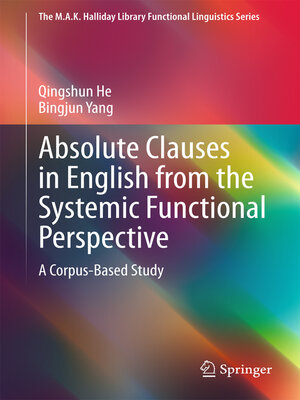Absolute Clauses in English from the Systemic Functional Perspective
ebook ∣ A Corpus-Based Study · The M.A.K. Halliday Library Functional Linguistics Series
By Qingshun He

Sign up to save your library
With an OverDrive account, you can save your favorite libraries for at-a-glance information about availability. Find out more about OverDrive accounts.
Find this title in Libby, the library reading app by OverDrive.



Search for a digital library with this title
Title found at these libraries:
| Library Name | Distance |
|---|---|
| Loading... |
This book focuses on the structural diversity, semantic variability, case choice, stylistic characteristics and diachronic distribution of English absolute clauses. The syntactic roles assumed by absolute clauses in the traditional sense can be categorized into clausal adjuncts, attendant circumstances and appositives. These three types of function correspond to the three hypotactic expansions in the relation system of clause complexes in Systemic Functional Linguistics, i.e., elaboration, extension and enhancement. This research, therefore, redefines absolute clauses in the framework of SFL and proposes four syntactic types of absolute clauses: absolute paratactic clauses (elaboration), absolute hypotactic clauses (extension and enhancement), absolute projected clauses (fact and act) and absolute embedded clauses (subject). Based on the Brown family corpora, BNC and COHA, this research finds that different function types of absolute clauses differ in terms of their stylistic and diachronic distributions, and both nominative and accusative cases are acceptable.







